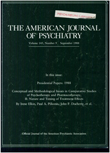Prevalence of anxiety disorders in patients with mitral valve prolapse
Abstract
Most previous research on mitral valve prolapse investigated its prevalence in patients whose primary diagnosis was one of the anxiety disorders. This study explored the inverse, i.e., the prevalence of anxiety disorders in patients manifesting mitral valve prolapse. There were no significant differences between patients (N = 48) and control subjects (N = 49) in panic disorder, phobic disorder, or generalized anxiety disorder or in the Zung depression score. The patient group scored significantly higher than control subjects on the Zung Anxiety Scale but significantly lower than Zung's patients with "anxiety neurosis". These results cast doubt on the hypothesis that mitral valve prolapse is etiologically related to the pathogenesis of the anxiety disorders.
Access content
To read the fulltext, please use one of the options below to sign in or purchase access.- Personal login
- Institutional Login
- Sign in via OpenAthens
- Register for access
-
Please login/register if you wish to pair your device and check access availability.
Not a subscriber?
PsychiatryOnline subscription options offer access to the DSM-5 library, books, journals, CME, and patient resources. This all-in-one virtual library provides psychiatrists and mental health professionals with key resources for diagnosis, treatment, research, and professional development.
Need more help? PsychiatryOnline Customer Service may be reached by emailing [email protected] or by calling 800-368-5777 (in the U.S.) or 703-907-7322 (outside the U.S.).



